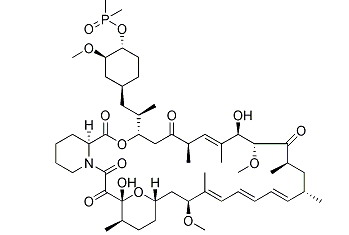All AbMole products are for research use only, cannot be used for human consumption.

Deforolimusis (also known as Ridaforolimus, AP23573 and MK-8669) is an investigational targeted and small-molecule inhibitor of the protein mTOR, a protein that acts as a central regulator of protein synthesis, cell proliferation, cell cycle progression and cell survival, integrating signals from proteins, such as PI3K, AKT and PTEN known to be important to malignancy. Deforolimusis blocking mTOR creates a starvation-like effect in cancer cells by interfering with cell growth, division, metabolism, and angiogenesis.
*The compound is unstable in solutions, freshly prepared is recommended
| Cell Experiment | |
|---|---|
| Cell lines | HCT-116, SK-UT-1, HT-1080, SW872, MCF-7, PC-3 cell lines |
| Preparation method | In vitro proliferation assays. Exponentially growing cell lines were plated into two 96-well plates and incubated overnight at 37°C. Twenty-four hours after plating, 1 plate (D1) was aspirated and stored at −80°C. The other plate (D4) was treated with 10-fold serial dilutions of ridaforolimus (1,000 to 0.0001 nmol/L) or vehicle (ethanol). Following 72 hours culture at 37°C, the plates were aspirated and stored at −80°C for proliferation analysis. The D1 and D4 plates were assessed simultaneously for cell growth using the CyQUANT Cell Proliferation Assay Kit (Invitrogen). Doubling time (DT) = [0.301 × (72)/log(day4/day1)]. Doublings = 72/DT. Cell growth rate (%) = doublings ridaforolimus/doublings vehicle × 100. Imax = 100 − cell growth rate (%) at the dose at which maximum inhibition is observed. Imax was used to determine the relative sensitivity of each cell line. |
| Concentrations | 0~1000 n M |
| Incubation time | 72 h |
| Animal Experiment | |
|---|---|
| Animal models | mice bearing PC-3, A549, HCT-116, MCF7, and PANC-1 tumors xenograft model |
| Formulation | diluted in a vehicle of 4% ethanol, 5% Tween 80, and 5% propylene glycol |
| Dosages | 3 and 10 mg/kg (a) daily, 5 continuous days every other week and (b) once weekly |
| Administration | i.p. |
| Molecular Weight | 990.21 |
| Formula | C53H84NO14P |
| CAS Number | 572924-54-0 |
| Solubility (25°C) | DMSO |
| Storage |
Powder -20°C 3 years ; 4°C 2 years In solvent -80°C 6 months ; -20°C 1 month |
| Related mTOR Products |
|---|
| RMC-4627
RMC-4627 is a selective mTORC1 inhibitor that activates 4EBP1 and inhibits tumor growth. |
| RMC-4529
RMC-4529 has an IC50 value of 1.0 nM against p-4E-BP1-(T37/46) in mTOR kinase cellular assay. |
| WYE-687 dihydrochloride
WYE-687 dihydrochloride is an ATP-competitive mTOR inhibitor with an IC50 of 7 nM. |
| Rapamycin-d3
Rapamycin-d3 |
| L-Leucine-d10
L-Leucine-d10 |
All AbMole products are for research use only, cannot be used for human consumption or veterinary use. We do not provide products or services to individuals. Please comply with the intended use and do not use AbMole products for any other purpose.


Products are for research use only. Not for human use. We do not sell to patients.
© Copyright 2010-2024 AbMole BioScience. All Rights Reserved.
